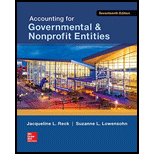
Accounting for Governmental & Nonprofit Entities
17th Edition
ISBN: 9780078025822
Author: Jacqueline L. Reck James E. Rooks Distinguished Professor, Suzanne Lowensohn, Earl R Wilson
Publisher: McGraw-Hill Education
expand_more
expand_more
format_list_bulleted
Question
Chapter 11, Problem 19.10EP
To determine
Find the correct option, the option that indicates the auditor’s responsibility for required supplementary information (RSI).
Expert Solution & Answer
Want to see the full answer?
Check out a sample textbook solution
Students have asked these similar questions
Answer
Determine Accounts receivable turnover ratio
What would the net realizable value of account receivable?
Chapter 11 Solutions
Accounting for Governmental & Nonprofit Entities
Ch. 11 - Prob. 1QCh. 11 - Prob. 2QCh. 11 - Prob. 3QCh. 11 - Prob. 4QCh. 11 - Prob. 5QCh. 11 - Prob. 6QCh. 11 - Prob. 7QCh. 11 - Prob. 8QCh. 11 - Prob. 9QCh. 11 - Prob. 10Q
Ch. 11 - Background. Lake View Mental Health Affiliates, a...Ch. 11 - Prob. 12CCh. 11 - Prob. 13CCh. 11 - Prob. 14CCh. 11 - Prob. 15CCh. 11 - Prob. 16CCh. 11 - Prob. 17CCh. 11 - Prob. 19.1EPCh. 11 - Prob. 19.2EPCh. 11 - Prob. 19.3EPCh. 11 - Prob. 19.4EPCh. 11 - Prob. 19.5EPCh. 11 - Prob. 19.6EPCh. 11 - Prob. 19.7EPCh. 11 - Prob. 19.8EPCh. 11 - Prob. 19.9EPCh. 11 - Prob. 19.10EPCh. 11 - Prob. 21EPCh. 11 - Prob. 22EPCh. 11 - Prob. 23EP
Knowledge Booster
Similar questions
- A company had net sales of $120,000 over the past year. 60% of the sales were credit sales. During that time, average receivables were $6,000. What was the average collection period? (Assume a 360-day year) a) 20 days b) 30 days c) 40 days d) 60 days e) 45 days MCQarrow_forwardwhat is the cash flow cycle?arrow_forwardAssume that retained earnings increased by $62,850 from June 30 of year 1 to June 30 of year 2. A cash dividend of $13,500 was declared and paid during the year. Compute the net income for the year.arrow_forward
arrow_back_ios
SEE MORE QUESTIONS
arrow_forward_ios
Recommended textbooks for you
 Auditing: A Risk Based-Approach (MindTap Course L...AccountingISBN:9781337619455Author:Karla M Johnstone, Audrey A. Gramling, Larry E. RittenbergPublisher:Cengage Learning
Auditing: A Risk Based-Approach (MindTap Course L...AccountingISBN:9781337619455Author:Karla M Johnstone, Audrey A. Gramling, Larry E. RittenbergPublisher:Cengage Learning Auditing: A Risk Based-Approach to Conducting a Q...AccountingISBN:9781305080577Author:Karla M Johnstone, Audrey A. Gramling, Larry E. RittenbergPublisher:South-Western College Pub
Auditing: A Risk Based-Approach to Conducting a Q...AccountingISBN:9781305080577Author:Karla M Johnstone, Audrey A. Gramling, Larry E. RittenbergPublisher:South-Western College Pub- Business/Professional Ethics Directors/Executives...AccountingISBN:9781337485913Author:BROOKSPublisher:Cengage

Auditing: A Risk Based-Approach (MindTap Course L...
Accounting
ISBN:9781337619455
Author:Karla M Johnstone, Audrey A. Gramling, Larry E. Rittenberg
Publisher:Cengage Learning

Auditing: A Risk Based-Approach to Conducting a Q...
Accounting
ISBN:9781305080577
Author:Karla M Johnstone, Audrey A. Gramling, Larry E. Rittenberg
Publisher:South-Western College Pub


Business/Professional Ethics Directors/Executives...
Accounting
ISBN:9781337485913
Author:BROOKS
Publisher:Cengage